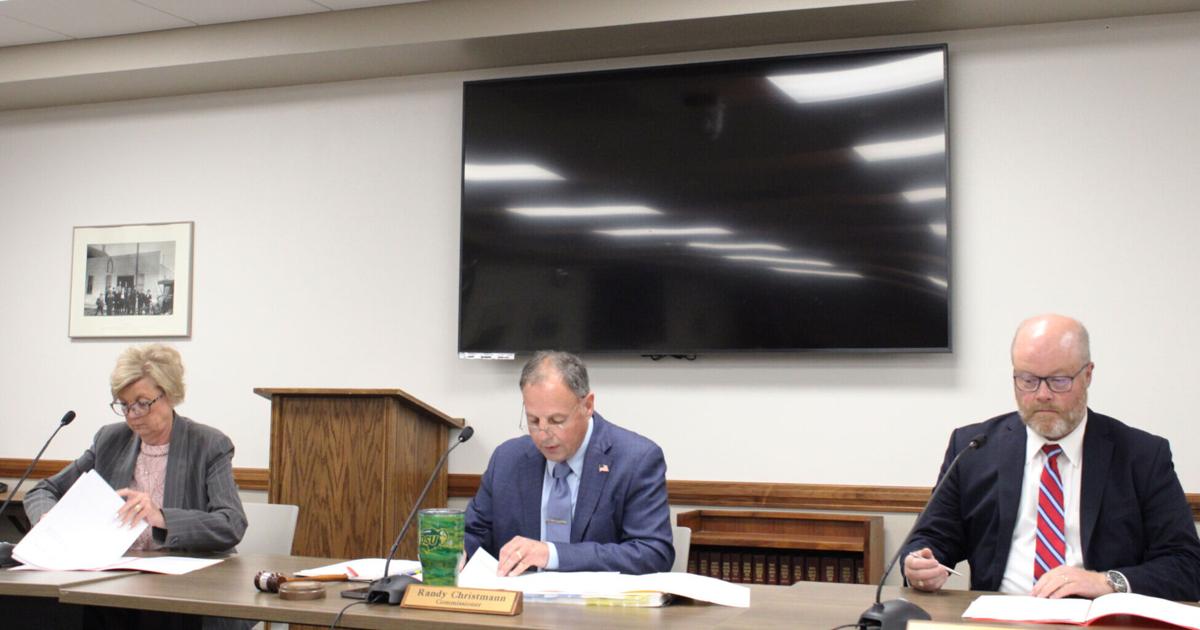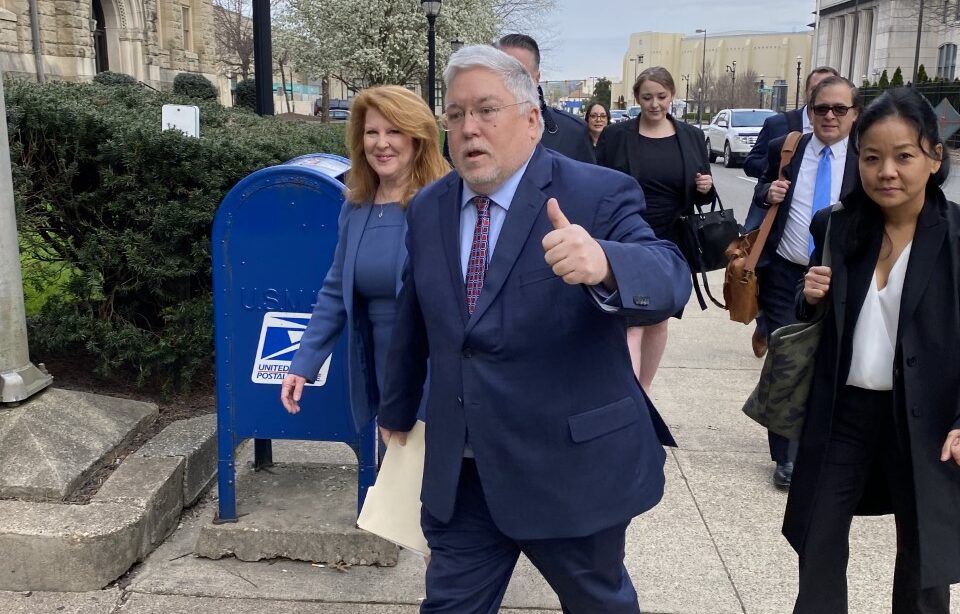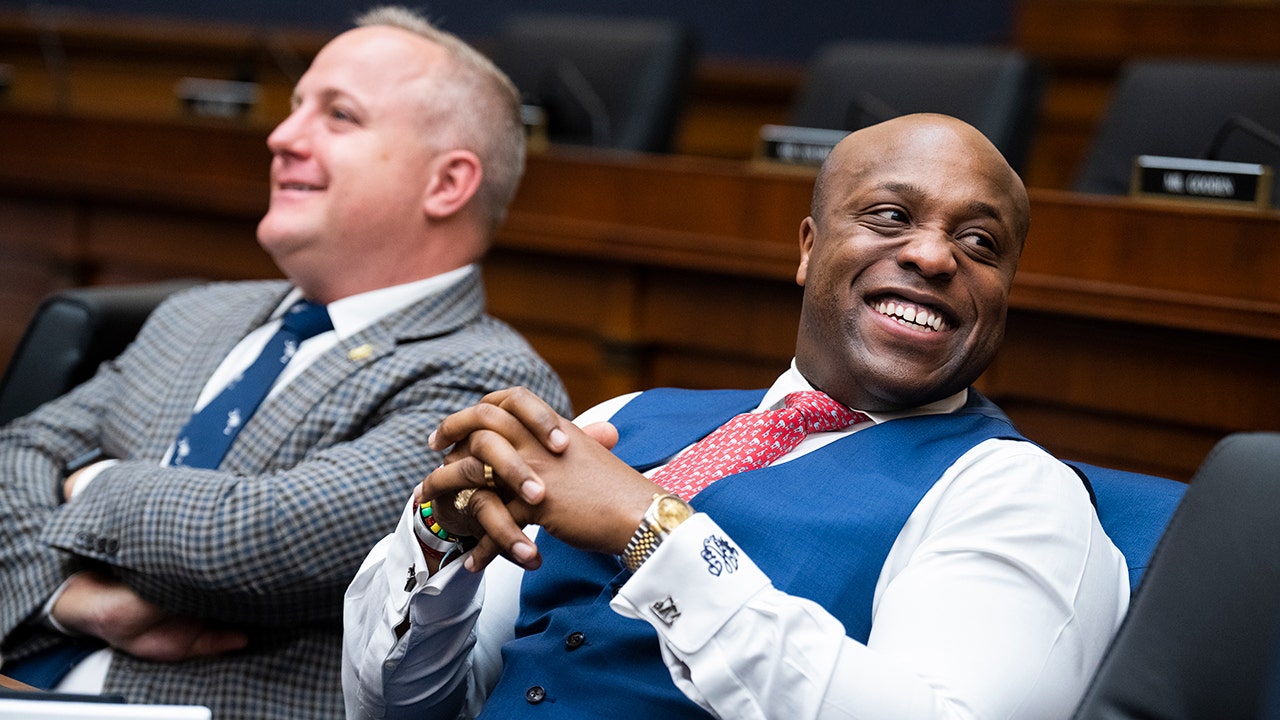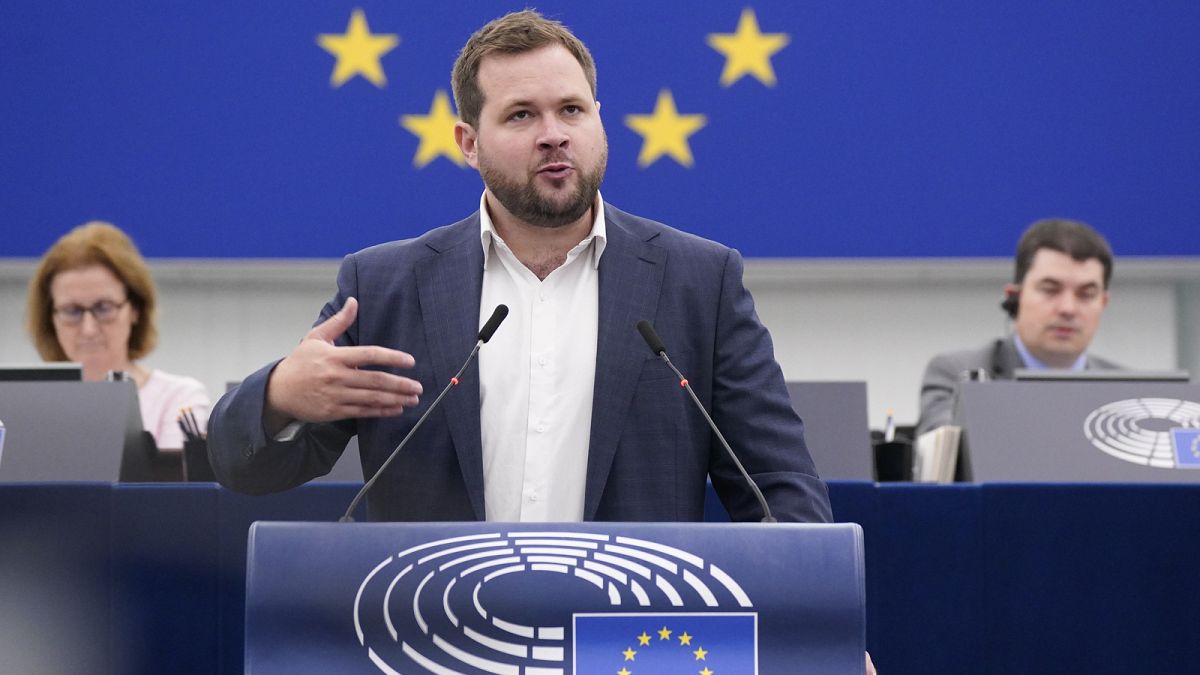North Dakota regulators on Friday rejected a route permit for a regional carbon dioxide pipeline that has been opposed by some landowners and public officials in several counties, and in some other states.
The unanimous vote by the three-member Public Service Commission comes after five public hearings over the course of four months earlier this year that drew large crowds comprised mostly of people who spoke against Summit Carbon Solutions’ $5.5 billion Midwest Carbon Express project.
North Dakota Public Service Commissioner Sheri Haugen-Hoffart, left, Commissioner Randy Christmann, center, and Administrative Law Judge Tim Dawson on Friday detail their reasoning for rejecting a route permit for Summit Carbon Solutions’ Midwest Carbon Express carbon dioxide pipeline.
Iowa-based Summit “failed to meet its burden of proof to show the location, construction, operation and maintenance of the project will produce minimal adverse effects on the environment and upon on welfare of the citizens of North Dakota,” Commission Chair Randy Christmann said.
He indicated that Summit could “start over and reapply” or “appeal to the courts.”
People are also reading…
Summit in a statement said it “respects the decision by the North Dakota Public Service Commission, and we will revisit our proposal and reapply for our permit.” The company initially applied in October 2022.
“We’re committed to understanding and incorporating the considerations outlined in the decision. We are confident that our project supports state policies designed to boost key economic sectors: agriculture, ethanol, and energy,” said the statement provided by Summit Marketing and Communications Director Sabrina Ahmed Zenor.

A sign outside the Emmons County Courthouse in Linton shows opposition to the planned Midwest Carbon Express pipeline.
PSC reasoning
The commission cited several reasons for its decision. They included that Summit had not adequately addressed how the project would impact sensitive areas including cultural sites, some wildlife areas and unstable geological areas.
The PSC in its order also said that Summit “has not taken the steps to address outstanding legitimate impacts expressed by landowners during the public comment or demonstrated why a reroute is not feasible.”
The commission also found that Summit did not properly address concerns related to future property values and development, which was a primary concern of local developers who hope to build properties to the north and east of Bismarck. However, the PSC also said that some developers “stretch the plausibility of the adverse impacts on future property values.”
Numerous landowners also expressed concerns over procuring liability insurance if they have a CO2 pipeline on their property. Summit for its part said it would cover the liability for a rupture or leak granted that a third party did not strike the line. The PSC found this suitable to protect landowners from liability issues.
The commission said a number of the issues brought up in public comments were outside its jurisdiction. These include eminent domain — which is the forced taking of private property with compensation — compliance with federal regulations, and the sequestration and storage of CO2.
Midwest Express
The company also has been pursuing clearance from regulators in other states where it also has encountered opposition, and it faces court battles over the use of some private land for the project. The company might also face a North Dakota investigation into whether the project has foreign investors that are prohibited under new state laws.
The pipeline is to move climate-warming CO2 emissions from dozens of ethanol plants in Nebraska, Iowa, South Dakota, Minnesota and North Dakota through a 2,000-mile pipeline system to western North Dakota’s Oliver County for permanent storage underground. Summit has said it hopes to have it operational next year.
There would have been 320 miles of pipeline in the state under the proposed route that the PSC rejected, along with aboveground facilities including pump stations. The project would have passed through Burleigh, Cass, Dickey, Emmons, Logan, McIntosh, Morton, Oliver, Richland and Sargent counties. The Burleigh portion would have consisted of 41 miles of pipe.

A map provided by Summit Carbon Solutions shows the route of its proposed carbon dioxide pipeline system.
North Dakota is seeking to keep energy production in line with new emissions standards in a number of markets. Gov. Doug Burgum has touted carbon capture projects as a way to do that. His spokesman, Mike Nowatzki, told the Tribune on Friday that “This is a matter between the PSC and the company, and we’ll continue to monitor it as the process plays out.”
Project opposition
The Summit project has sparked opposition from some landowners — including some in northern Burleigh County — and others who have concerns about property values, insurance problems and personal safety. Some officials worry the pipeline route less than 2 miles from Bismarck’s extraterritorial area at its closest point could impede the city’s northward progression. The city of Bismarck and Bismarck Public Schools have passed resolutions opposing the proposed route.
Summit has said it ruled out a route to the south of Bismarck, where the city is not rapidly developing, for several reasons including geography challenges, potential project delays and cost increases, and a desire to head off a Dakota Access-type protest.
Attorney Steven Leibel, who represents more than 40 landowners who opposed the route, said “I think our clients are ecstatic that they had their concerns heard and that the Public Service Commission took them seriously and listened. We’re very happy with the result.
“All we want to see is that these projects … proceed methodically and proceed with safety in mind,” Leibel said.
Former Bismarck Mayor John Warford, whose property north of Bismarck would have been impacted by the pipeline route, said “It is not a good day for Summit.”
“(The PSC decision) was a testimony to how North Dakota does business, and I think we have a commission that did the right thing and showed great common sense — that’s what we want in our elected officials,” he said.
Several groups that advocate for landowners and the environment issued a joint statement praising the PSC decision. The Bold Alliance, Domina Law Group and Dakota Resource Council called the Summit project a “pipeline to nowhere,” with the North Dakota portion leading to the disposal site rejected.

The North Dakota portion of the proposed route for the Midwest Carbon Express pipeline.
Some county governments including Burleigh’s and Emmons’ have passed ordinances to regulate the pipeline within their borders. Burleigh County Commission Chair Becky Matthews told the Tribune that she’s pleased with the “PSC listening to the commission.”
“I’m very proud of our county to have our people’s voices elevated for the PSC to hear,” she said.
Summit had earlier asked the PSC to declare the Burleigh and Emmons ordinances “superceded and preempted” by state and federal law, calling them “unreasonably restrictive.” The PSC ultimately decided Friday that the point was moot.
Some officials and landowners publicly urged the PSC to delay a decision on permitting the pipeline route until new federal safety regulations for CO2 pipelines are in place.
The Pipeline and Hazardous Materials Safety Administration is updating rules in the wake of a CO2 pipeline operated by Denbury Gulf Coast Pipelines rupturing in Satartia, Mississippi, in 2020 that resulted in 45 people seeking hospital care.
Summit touts the overall safety record of the thousands of miles of CO2 pipelines that have operated in the U.S. for decades, including in western North Dakota. The company also has said that issues outlined by PHMSA in its Satartia Failure Investigation Report have been factored into the “planning, design, construction and operations” of the Midwest Carbon Express project.

A North Dakota Public Service Commission public hearing June 2 on Summit Carbon Solutions’ planned Midwest Carbon Express pipeline drew a large crowd. The hearing was in Russell Reid Auditorium at the North Dakota Heritage Center & State Museum on the Capitol grounds in Bismarck.
Summit has been working to secure easements from property owners so it can place the pipeline on their land. Some reluctant landowners worry the company will resort to eminent domain — the seizure of private property use, with compensation. The company has filed dozens of eminent domain lawsuits in South Dakota. But it also maintains it strives to come to agreeable terms with landowners, and that most support the project.
The 2023 North Dakota Legislature considered several bills dealing with CO2 pipelines and eminent domain, but most of them failed.
The Legislature also passed two bills aimed at limiting or stopping foreign countries and companies from owning, developing or having an interest in land in North Dakota. A group of 31 lawmakers earlier this year asked Attorney General Drew Wrigley to investigate the ownership and investors of Summit Carbon Solutions. Summit maintained the lawmakers were “making unfounded accusations” after unsuccessfully targeting the company during the legislative session.
Wrigley in June said the request didn’t meet the necessary requirements, in part because the laws didn’t take effect until Aug. 1, and because a request needs to be made made by a city council or commission, county commission, or a title agent. He did not rule out an investigation in the future, saying that if he received a valid request after the laws took effect he would conduct a review “as required by law.”
Burleigh County has been working on drafting a letter to send to Wrigley. State’s Attorney Julie Lawyer said she was submitting it Friday.
Summit has said it “is in compliance with North Dakota law.”

North Dakota Public Service Commissioner Randy Christmann
Another hurdle
The PSC decision was made by Christmann, Commissioner Sheri Haugen-Hoffart and Administrative Law Judge Tim Dawson. Dawson late last year was appointed as a substitute decision-maker in the case to replace Commissioner Julie Fedorchak, who recused herself from any siting decisions pertaining to the pipeline. Fedorchak and her husband own land in Oliver County and signed a contract with Summit to store carbon dioxide there.
The crowd in the room began clapping after the PSC voted, prompting Christmann to admonish those in attendance to keep their emotions in check.
The PSC has regulatory authority over the pipeline route, but the state Industrial Commission — composed of the governor, attorney general and agriculture commissioner — has authority over the proposed CO2 storage area.
“They have to show that there’s a necessity for it; if you don’t have a pipeline that gets CO2 to a storage area you don’t need a storage area,” landowner attorney Derrick Braaten said.
Plume model
The PSC on Friday also denied requests to make Summit’s dispersion model public information. A dispersion model estimates the potential spread of a chemical if a rupture were to occur in a pipeline.
Geography, weather and atmospheric conditions determine the spread of CO2, according to Kenneth Clarkson, communications director for the Pipeline Safety Trust. Due to CO2 being heavier than air and lacking an odor, it has the potential to spread close to the ground undetected if a leak were to occur.
Summit argued that its pipeline is critical infrastructure and that sharing information from the security system plan related to the dispersion study could enable bad actors to strike it.
Intervenors in the case argued that the dispersion model is public health information and can be separated from details in the security system plan that could threaten the pipeline’s integrity.
The PSC agreed with Summit’s argument.




























